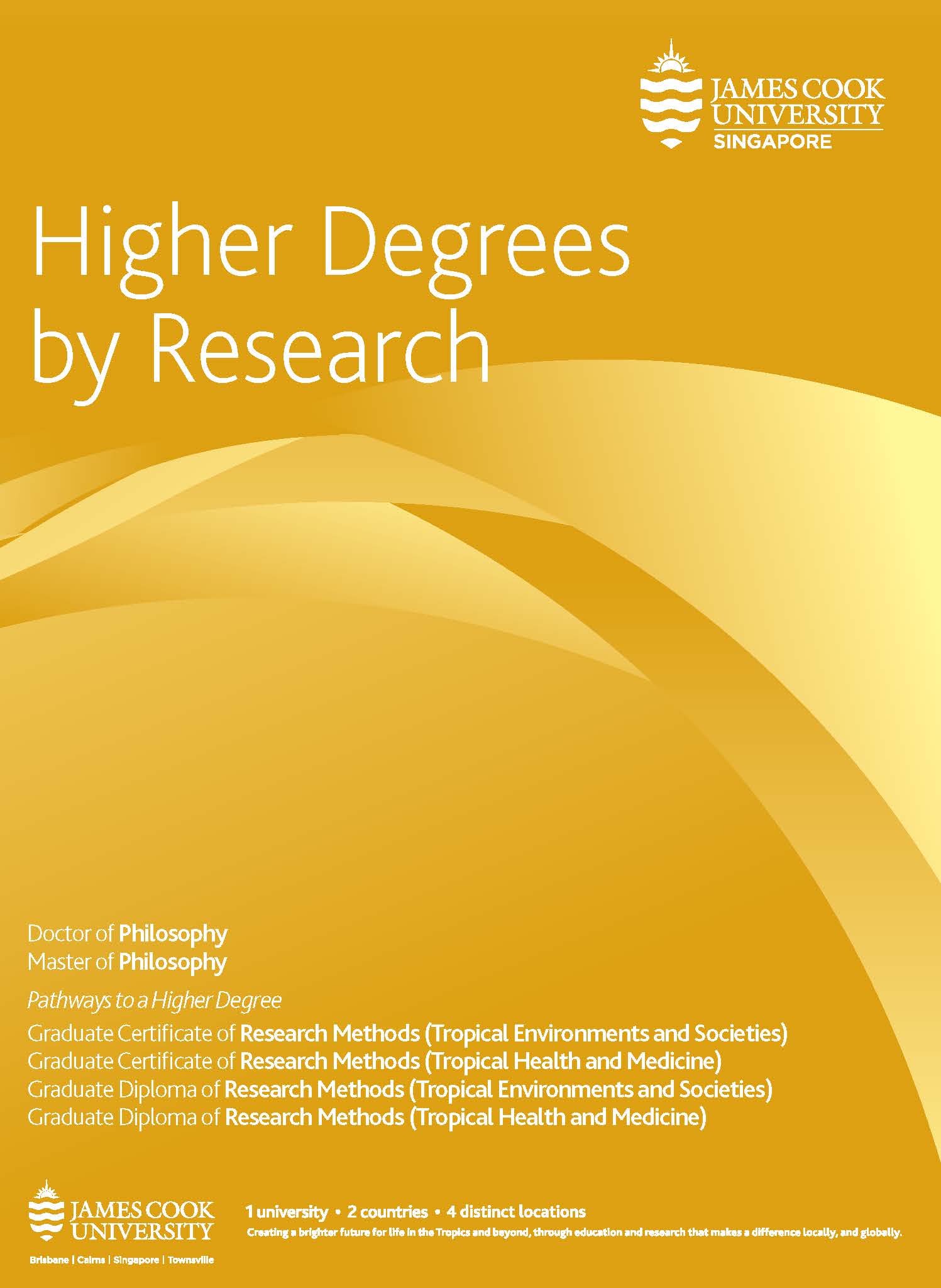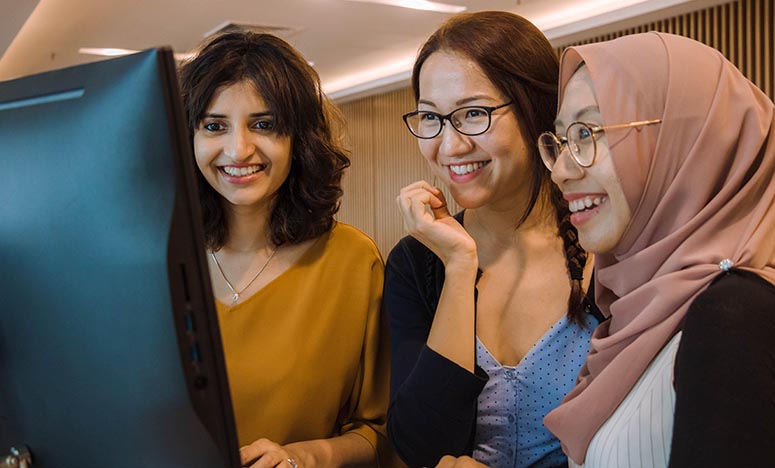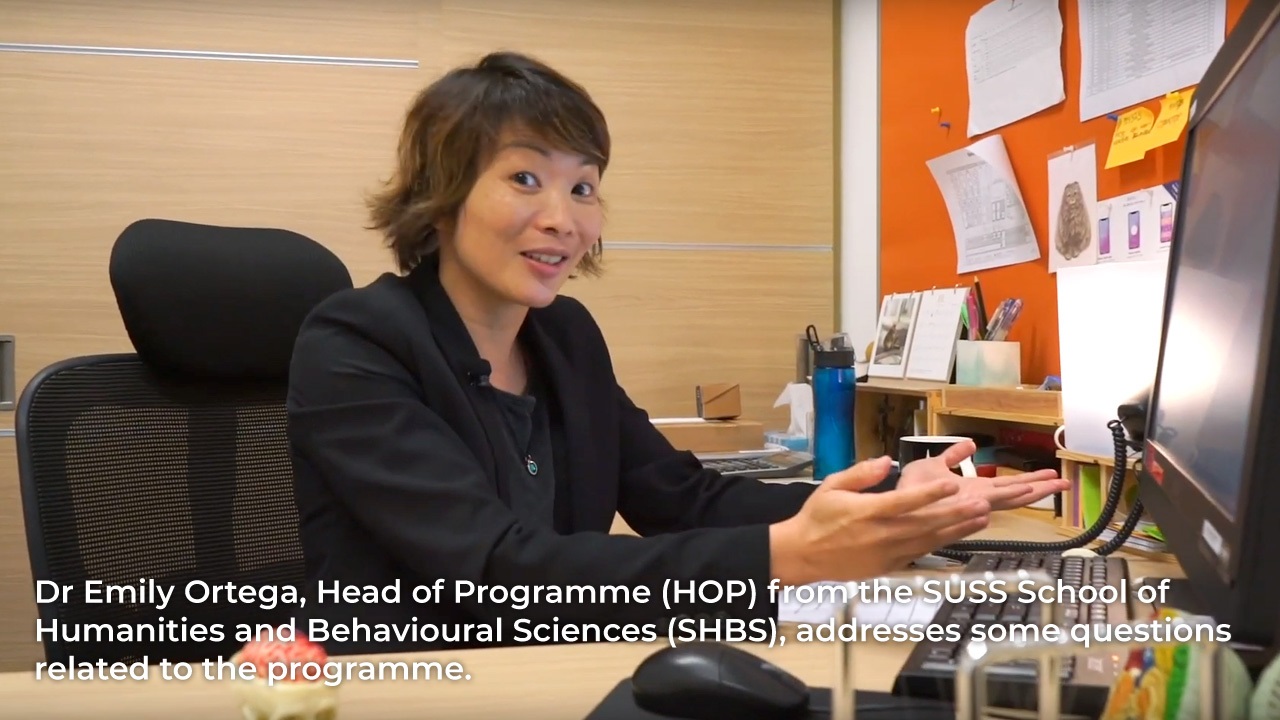
Level Up your Future

PhD in Psychology – SMU
by headstarttest . In Arts & Social Sciences , PhD .
We equip you with critical knowledge and skills to conduct rigorous psychological research .
We have a group of professors who are top scholars with international reputations . They jointly provide a diverse range of expertise in the research areas mentioned in the box above.
Our programme, which emphasises interactive learning and integrative evaluation of diverse perspectives , prepares our graduates for psychology-related careers in academia and industry.
This PhD in Psychology programme equips students with doctoral-level knowledge in content areas in psychology and research methodology, with a focus on areas in experimental, social, personality and organisational psychology.
Students will learn, from both coursework and hands-on research experiences, to link psychological theory, study design, measurement, and data analysis in order to make substantive inferences and evidence-based recommendations to theory and practice that are scientifically defensible. Students in the programme have presented their work at international conferences and published their research in top journals in psychology. Graduates of the programme will be well-prepared for careers in universities, research institutes and industry.
A PhD student will typically focus on coursework in the first one to two years, followed by a Master’s thesis and the dissertation research in subsequent years.
The PhD framework is as follows:
- 6 Foundation Courses (6 Course Units)
- 2 Electives (2 Course Units)
- Empirical Research Project (1 Course Unit)
- Master’s Thesis (12 Course Units)
- 3 Advanced Research Topics (ART) Courses (3 Course Units)
- PhD Dissertation (28 Course Units)
The coursework is intended to lay the groundwork in preparation for the dissertation research. A student in the programme will be required to finish a Master’s thesis by submitting the written thesis and orally defending it. The student will then have to sit for a PhD Qualifying Examination (QE), which will assess his or her mastery of the foundation required for the next stage of the PhD programme – the dissertation. The dissertation is a student’s original work in his or her specialised area through independent research. The dissertation is marked by two major milestones listed below.
Oral Defence of the Dissertation Proposal This is an oral presentation of the proposed topic to a Dissertation Committee. A written dissertation proposal will have to be submitted before the presentation. A supervisor, with the expertise in the chosen topic, will be appointed. He or she guides and mentors the student throughout the dissertation work.
Oral Defence and Completion of the PhD Dissertation This is an oral presentation of the written dissertation report to the Committee. After possible revision(s) to the report and upon fulfillment of all necessary requirements, the Committee will recommend to the University to award the PhD degree. Students will also attain an MSc degree upon completion of the PhD programme.
- Good Bachelor’s degree in Psychology or relevant training/experience
- The GRE General test is required for all applicants except those graduating with a bachelor degree (in any discipline) from SMU, NUS, NTU & SUTD (i.e., Singapore autonomous universities). Applicants from these universities will be considered without GRE scores. However, they are encouraged to submit their scores, if available.The GRE Psychology Subject test is not required. However, applicants without a bachelor degree in psychology are strongly encouraged to take it and submit their results so that their knowledge in basic psychology can be taken into consideration when their applications are reviewed.
Dates For more information on Application Dates, click here .
Fees For more information on Fee, Scholarships and Finance matters, click here .
Office of Postgraduate Research Programmes Administration Building, Level 12 81 Victoria Street Singapore 188065 Tel : (65) 6828 0100 Email : [email protected]
Share this:
- Click to share on Facebook (Opens in new window)

- Skip to main content

- All countries /
- Singapore /
- All study levels /
- Postgraduate /
- Health and Medicine /
3 Universities in Singapore offering Doctoral Degrees Psychology degrees and courses
More Information
Are you looking for Doctoral Degrees courses in Psychology? Here you can find course providers offering full-time, part-time, online or distance learning options.
You've reached your limit of 10 Favourites
Singapore Management University (SMU)
Nanyang technological university (ntu).
THE World Ranking: 32
NIE Singapore (NTU)
There are more Psychology courses available in Asia
- Behavioural Psychology
- Cognitive Psychology
- Psychological Counselling
- Psychology (General)
- Study level:
- Postgraduate
- Doctoral Degrees
- Study mode:
Filter your results
Tell us about you.
- Nationality Select country Select country
- My current qualification is from Select country Yes No Select country Select country
- Current qualification {0} is not applicable for the study level you selected below. Qualification Qualification
- Grade type (only one grade type for your qualification) Grade type Grade type
- My score (current or expected) Please select Please select Please select Please select Please select Please select
Tell us your preferences
- Subject Psychology
- Qualification Doctoral Degrees
- Destination Singapore
- Study options
- Annual tuition fees
Subject areas
Qualification, destination.

Doctor of Philosophy
- ENQUIRE NOW
Course overview
The Doctor of Philosophy (PhD) is a program of supervised original research. It culminates in the submission of a thesis that demonstrates the ability for critical analysis and research that makes a significant and original contribution to the knowledge and understanding of the field of study.
Your research topic
Applicants need to discuss their proposed research topic with an appropriate research supervisor. Please contact us for details.
You can check the information on potential research advisors in our website https://www.jcu.edu.sg/research/research-capability-statement
James Cook University will form an advisory panel comprised of a Primary and Secondary Advisor and, in some cases, an Advisor Mentor to assist Higher Degree by Research candidates in their research journey.
Research areas available include: education, social sciences, game design , banking and finance , management and commerce , tourism , psychology , aquaculture , marine ecology, interdisciplinary topics. Other themes can be arranged to meet the needs of candidates
**Carousel/Block intakes are for commencing students only, subsequently, students will progress with the trimester.
Study Program
Candidates are required to complete the core subjects before embarking on the thesis component as per course structure below.
Course Structure
Core subjects
- Planning the Research: Doctoral Candidates
- Situating the Research: Doctoral Candidates
- Professional Development: Doctoral Candidates
+ One of the below
- Doctor of Philosophy Research Thesis (Agriculture, Environmental and Related Studies)
- Doctor of Philosophy Research Thesis (Education)
- Doctor of Philosophy Research Thesis (Health)
- Doctor of Philosophy Research Thesis (Information Technology)
- Doctor of Philosophy Research Thesis (Management and Commerce)
- Doctor of Philosophy (Natural and Physical Sciences)
- Doctor of Philosophy Research Thesis (Society and Culture)
For a comprehensive listing and outline of the respective course subjects, please click here
Course Learning Outcomes
Graduates of a Doctoral Degree will have:
- A substantial body of knowledge at the frontier of a field of work or learning, including knowledge that constitutes an original contribution
- Substantial knowledge of research principles and methods applicable to the field of work or learning.
- Cognitive skills to demonstrate expert understanding of theoretical knowledge and to reflect critically on that theory and practice
- Cognitive skills and use of intellectual independence to think critically, evaluate existing knowledge and ideas, undertake systematic investigation and reflect on theory and practice to generate original knowledge
- Expert technical and creative skills applicable to the field of work or learning
- Communication skills to explain and critique theoretical propositions, methodologies and conclusions
- Communication skills to present cogently a complex investigation of originality or original research for external examination against international standards and to communicate results to peers and the community
- Expert skills to design, implement, analyse, theorise and communicate research that makes a significant and original contribution to knowledge and/or professional practice.
Graduates of a Doctoral Degree will demonstrate the application of knowledge and skills:
- With intellectual independence
- With initiative and creativity in new situations and/or for further learning
- With full responsibility and accountability for personal outputs
- To plan and execute original research
- With the ongoing capacity to generate new knowledge, including in the context of professional practice.
Eligibility & Requirements
Entry requirements.
All applicants must normally demonstrate academic capacity at a satisfactory level (Grade Point Average of Credit or equivalent) in their final year of coursework study that was used as part of the basis for admission.
Applicants must demonstrate the capacity to undertake research at the Doctoral level by the attainment of at least one of the following:
- A Bachelor’s degree with at least Second Class Honours in a degree program that included a total of at least a semester of supervised project work, the results of which contributed to the Honours grade; or
- A postgraduate qualification which included: (a) supervised research component(s) of at least one semester or equivalent and resulted in the production of output(s) graded at the equivalent of Distinction or better, and (b) at least one research methods subject; or
- A Research Masters degree, where at least two thirds of the degree consisted of a supervised research component and resulted in the production of a thesis or equivalent; or
- A combination of qualifications, research training and experience, considered equivalent to the above and deemed appropriate by the university, e.g., senior authorship of at least one peer-reviewed publication plus completion of an appropriate research methods subject.
Note: Candidates who do not meet any of the above may apply for a higher degree pathway offered in the form of the Graduate Certificate of Research Methods or the Graduate Diploma of Research Methods.
English Requirements
- Applicants of non-English speaking backgrounds must meet the English language proficiency requirements of IELTS 6.5 (no component lower than 6.0) / TOEFL (Internet Based) 86 (no component less than 21) / Pearson PTE Academic 58 (no component less than 54); or
- Satisfactory completion of James Cook University Singapore English Language Preparatory Program (ELPP) ; or
- Successful completion of other qualifications completed in English Language deemed comparable to Australian standards on a case-by-case basis in accordance to JCU admissions guidelines
Recognition of Prior Learning
Applicants seeking to transfer their Higher Degree by Research candidature from another Australian University should refer to the JCU Recognition of Prior Learning Procedure.
Attendance Requirements
International students holding a valid Student's Pass are required to attend at least 90% of scheduled classes per month. Failure to attend classes is a breach of the student visa conditions. Being absent from classes for a continuous period of seven days or more, or attendance falling below 90% without valid reasons will result in the student needing to surrender their Student's Pass for cancellation.
Domestic students must attend at least 75% of the scheduled lecture and tutorial activities to be eligible for assessment.
Career Outcomes
The Doctor of Philosophy is an essential prerequisite for research and academic careers in most disciplines. Candidates can also look for R&D opportunities in a variety of industry sectors, NGO and government agencies.
How to apply
Agriculture, Environmental and Related Studies
Management and Commerce
Natural and Physical Sciences
Society and Culture
How to Apply Online and Online Application Guideline
Tuition Fees
| Domestic** | International |
|---|---|
| S$135,541.50 | S$142,408.50 |
**Fees apply to all Singapore residents (Singapore Citizens, Permanent Residents and all pass holders excluding those holding a Student Pass).
- All course fees include the corresponding Singapore Goods and Services Tax (GST), which is 8% in 2023.
- All course fees include the corresponding Singapore Goods and Services Tax (GST), which is 9% in 2024.
- The details of the instalment breakdown will be provided in your Student Contract. Please contact us for further details.
Note: International students in Singapore on a Student Pass are not permitted to work. For more information please visit http://www.ica.gov.sg .
James Cook University is EduTrust Certified. The EduTrust certification scheme is administered by the Committee for Private Education (CPE), a part of SkillsFuture Singapore (SSG). EduTrust requires all students to be covered under a Fee Protection Scheme. In James Cook University, this is provided through an insurance protection scheme. Further, EduTrust also requires that the students must be covered under a medical insurance coverage which has provision for hospitalisation, surgery and treatment costs throughout their course duration. James Cook University will advise in the Standard Student Contract the total amount of insurance payable.
For more details please visit the Committee for Private Education (CPE), a part of SkillsFuture Singapore (SSG) website: https://www.skillsfuture.gov.sg/pei
Disclaimer Although James Cook University endeavours to ensure the accuracy of this information, there is no guarantee it will remain accurate all year. Applicants are advised to confirm program details with the appropriate school before making an application.

Download the Higher Degrees by Research brochure here .
If you wish to make further enquiries or submit your Expression of Interest, please contact [email protected] For the Expression of Interest form, please download here

College of Humanities, Arts and Social Sciences
How can we help you?

Financial Matters

Student Exchange

Student Life

Overseas exchanges

Course finder

Alumni events

Alumni stories

Professional development

Alumni discounts

Research Focus
/enri-thumbnails/careeropportunities1f0caf1c-a12d-479c-be7c-3c04e085c617.tmb-mega-menu.jpg?Culture=en&sfvrsn=d7261e3b_1)
Research Hub

Academic partners
Research collaborations.
7e6fdc03-9018-4d08-9a98-8a21acbc37ba.tmb-mega-menu.jpg?Culture=en&sfvrsn=7deaf618_1)
Information for Suppliers

Suppliers User Guide for Ariba
PhD Programmes
The College prepares students for a fast-changing globalised knowledge economy, and for those interested in teaching and research, to become future leaders in their academic fields. A full range of programmes await those who are willing to traverse the challenging and yet wondrous journey of discovery with us. Whether in design and media art, communication and information studies, economics, English literature, history, Chinese studies, international relations, linguistics, psychology, philosophy, public policy, sociology, Asia research, or thematic areas such as ageing and health, migration and population, digital humanities, urban complexities, or science, technology and society, that cross disciplinary boundaries, our students work alongside top scholars not only from the College but also the other Schools and Colleges at NTU, and have opportunities to collaborate with other researchers and postgraduate students from our many overseas partner universities.

Interdisciplinary Graduate Programme
In keeping with global trends and needs, students at the Interdisciplinary Graduate Programme at NTU will concentrate on two or more disciplines, instead of one.
The establishment of the Interdisciplinary Graduate Programme is an exciting development for both NTU and Singapore. Today, fresh thinking is urgently needed to mitigate many global challenges, not least in environmental sustainability, the creation of viable alternative energy solutions, future healthcare, new media and many other wide-ranging and complex issues.
The Interdisciplinary Graduate Programme is expected to integrate innovative and interdisciplinary thinking across the university, and strengthen NTU's role as a vital player in catalysing the development of breakthrough ideas and technologies out of the university and into the world.


School of Art, Design and Media
The doctoral programme provides creative research opportunities in a wide spectrum of academic areas. Students are expected and encouraged to develop innovative ways of thinking, and to experiment and create in a range of media. This programme also acts as an incubator for the development and realization of original artistic and professional productions, including design, interactive media, film, animation and new art forms.
/soh-thumbnails/image-142-(11).png?sfvrsn=18660001_0)
School of Humanities
The PhD programme at SoH will enable you to gain a solid background in research and be fully equipped to have a career in research and teaching in world-class universities. The programmes are offered in most of the disciplines: Chinese, English, Linguistics & Multilingual Studies, History, and Philosophy. The School offers Graduate Research Degrees in all of these disciplines.

School of Social Sciences
The programme is offered in all four of our subject areas: Economics, Psychology, Public Policy & Global Affairs, and Sociology. Each subject has outstanding faculty members who continually strive towards engaging and promoting vibrant intellectual life through excellent education and research. Our faculty members have won a host of prestigious prizes globally including Fulbright Awards, Fung Princeton Fellowships, the American Sociological Association Feminist Scholar Activist Award, the Canadian Sociological Association Early Investigator Award, among many others. They have published their research in the best journals and in top presses, such as, University of California Press, Cornell University Press and Cambridge University Press.
/wkwsci-thumbnails/image-148-(26).png?sfvrsn=7305bf12_0)
Wee Kim Wee School of Communication and Information
The research programme is specially designed for students to work with faculty members with diverse research interests in the fields of communications and information studies. Research students have the opportunity to present their research work at regional and global conferences. In addition, they get the opportunity to collaborate with faculty on numerous publications in top academic journals. The research students in the PhD programme are exposed to classroom teaching opportunities to prepare them for an academic career.
You may also be interested in
- Undergraduate Programmes
- Graduate Programmes
- Masters by Coursework
- Masters by Research

- Programme Finder
BSc Psychology (Part-Time)
Applications Open: 01 April 2024
Applications Close: 30 September 2024
Next Available Intake: January 2025
Programme Type: Part-time Undergraduate
Fees: View More Details on Fees
Area of Interest: Humanities and Social Sciences
School/Department: School of Humanities & Behavioural Sciences
Register for our programme briefing session at the SUSS e-Open House on 31 Aug 2024 (Sat) to have your queries answered by our faculty. You can also watch our programme briefing video at your own time and attend enrichment talks by industry experts. Register Now!
A broad-based programme covering a range of theoretical, conceptual, analytical and functional skills in Psychology. You will receive a comprehensive education in Psychology, and you may choose from specialised electives such as in organisational/work psychology and health psychology/well-being.
Students may pursue Psychology as a single major or in combination with Minor .
Click here to view the programme video.

Admission Requirements
Financial assistance, programme structure.
To graduate with a basic degree, students are required to complete 130 credit units (cu), which include:
- 20 cu of SUSS Core courses
- 50 cu of Major Compulsory courses
- 30 cu of Major Elective courses (Students to take any 1 out of 3 specialisation tracks, or general track)
- 30 cu of Free Electives or Minor
This programme has an honours option. Students who achieve a cumulative grade point average (CGPA) of 3.5 and above upon completion of their basic degree may be invited to enrol in the honours programme, which will be offered only if the requisite number of students is met. Graduating students who meet the eligibility criteria for an Honours classification will be awarded an honours degree based on aggregate academic performance measured by the CGPA assessed throughout the degree programme.
To graduate with an honours degree, students are to complete an additional 40 cu to achieve a total of 170 cu, which include:
- 30 cu of SUSS Core courses
- 70 cu of Major Compulsory courses
- 40 cu of Free Electives and/or Minor
| Module Types | ||
|---|---|---|
| (Students need to complete at least 5 cu of level 3 and above courses as electives.) | ||
| (Students can use 30 cu to take a minor.) | ||
This programme is for all those who find Psychology interesting, and wish to pursue it either as a career or as an aid to some other career. The degree programme is enriching for those who are in jobs that involve working with people or that require an understanding of them. Sometimes, what is needed are skills to understand people as people; in other situations, an objective and detached judgement is required. In either case, however, grounding in Psychology is helpful.
A psychology bachelor's degree is a general social sciences degree. Graduates can basically work in any field. However, to pursue a career in psychology (e.g., as a clinical counsellor , educational, or academic psychologist), a higher degree in psychology is required (e.g. Master's or PhD). Some of our alumni, after having obtained an honours degree in psychology at SUSS, have pursued a master’s/ PhD degree at SUSS and in other local and international universities.
Related Programmes

- Graduate Studies
Master of Psychology
Applications Open: 01 April 2024
Applications Close: 31 July 2024
Next Available Intake: January 2025
Area of Interest: Humanities and Social Sciences

- Full-time Undergraduate
Bachelor of Science in Psychology
Applications Open: To be confirmed
Applications Close: To be confirmed
Next Available Intake: July 2025

- Part-time Undergraduate
BA Sociology
Applications Close: 30 September 2024
*Please select at least 1 field
This site uses cookies to offer you a better browsing experience. By continuing to navigate through this site or by clicking “Close”, you are consenting to the use of cookies on your device as described in our privacy statement.

- Relationships
The Way We Communicate Matters
Here are four major communication styles and how they impact our relationships..
Posted August 2, 2024 | Reviewed by Davia Sills
- Why Relationships Matter
- Take our Relationship Satisfaction Test
- Find counselling to strengthen relationships
- Communication styles (assertive, passive, passive aggressive, and aggressive) can impact relationships.
- When a person is assertive, they clearly state their needs and why those needs are important.
- When a person is passive, they share their needs but aren’t direct when doing so.
- In aggressive communication, a person expresses needs in a hostile manner and may cross boundaries.

There are four main types of communication styles: passive, aggressive, passive aggressive , and assertive . These styles can impact our relationships as they affect the way in which we communicate our needs and respond to one another. In order to illustrate these styles, consider a person who wants to communicate to their partner that they need more solo time.
Assertive Communication
When a person is assertive, they clearly state their needs and why those needs are important. A person may share, “I would like to have some alone time during the day. When all of my plans involve others, I get stressed as I need time by myself.”
Here, the person is clearly expressing their needs through “I statements” and sharing why the need is important to them. This is both informative and includes a clear message.
Passive Communication
When a person is passive, they share their needs but aren’t direct when doing so. In that respect, they aren’t taking full ownership of the message. A person may say, “It would be nice to have more personal time.”
Here, they are communicating the need for solo time but not explicitly stating it and are also not providing any additional context or the why. While the partner may get the hint and understand what is needed, that isn’t guaranteed. This can lead to more frustration down the road.
Aggressive Communication
When a person is aggressive, they tend to express needs in a hostile manner and cross boundaries when doing so. While a person may be heard, they may offend those they are speaking or shouting to. An example would be a person yelling at their partner, “Leave me alone!” Other examples of aggressive communication involve being caustic or overly sarcastic.
Passive-Aggressive Communication
A person who is being passive aggressive is also hostile in the way they communicate, but it is less direct than being overtly aggressive. For example, you may say, “I wish I had more solo time like you to just do whatever I please.” Here you are focusing on the partner’s behavior, not your needs, and are indirectly criticizing them.
Being assertive is important because passive-aggressive and aggressive communication can harm the relationship. Passive communication leaves too much room for interpretation (and misinterpretation) of your needs.
By being more aware of the style we revert to, we can be better at repairing it. Knowing the communication style that your partner tends to revert to is helpful because even if it isn’t the most beneficial way of getting a point across, you can be aware of what their habits are as they try to change or adjust to a more effective communication style.

Marisa T. Cohen, Ph.D. , is a psychology professor, relationship researcher, and author of From First Kiss to Forever: A Scientific Approach to Love .
- Find a Therapist
- Find a Treatment Center
- Find a Psychiatrist
- Find a Support Group
- Find Online Therapy
- International
- New Zealand
- South Africa
- Switzerland
- Asperger's
- Bipolar Disorder
- Chronic Pain
- Eating Disorders
- Passive Aggression
- Personality
- Goal Setting
- Positive Psychology
- Stopping Smoking
- Low Sexual Desire
- Child Development
- Self Tests NEW
- Therapy Center
- Diagnosis Dictionary
- Types of Therapy

Sticking up for yourself is no easy task. But there are concrete skills you can use to hone your assertiveness and advocate for yourself.
- Emotional Intelligence
- Gaslighting
- Affective Forecasting
- Neuroscience
The Ohio State University
Master’s of Social Work Apply today
Msw program: it is designed to fit your life.
- Our Traditional MSW program is offered in Autumn, Spring and Summer semesters and is available on the Columbus campus and online. Our Traditional MSW degree can be completed full time in two years or part time in either three or four years.
- Our Advanced Standing Alternative Plan (ASAP) MSW program is offered Autumn, Spring and Summers semesters and is available on the Columbus campus and online. It is designed for students who have earned their Bachelor of Social Work (BSSW) degree within the last five years and achieved a 3.0 undergraduate GPA for your social work degree and a “B” or better in all required social work courses. The ASAP plan can be completed full time in one year (three semesters) or part time in two years (six semesters).
Start Your Online Application
Zoom Information Sessions
Prospective applicants are strongly encouraged to attend an informational session prior to applying to the MSW and Dual Degree programs. At the zoom meeting, we will cover in detail the program, careers, application process, curriculum and so much more.
- Register for July 8 @ Noon ET on Zoom
- Register for July 25 @ 5 p.m. ET on Zoom
If you have any questions, email Qu Twilley, the MSW Outreach Programs Coordinator, at [email protected] .
Application Process
The MSW program application opens annually on Sept. 1 . This includes both the advanced standing (ASAP) and traditional MSW program applications.
To be considered for fellowships, the application and all supporting materials must be received by Dec. 1 . Learn more about fellowship requirements here:
https://gradsch.osu.edu/pursuing-your-degree/graduate-fellows
The College of Social Work scholarship deadline is March 15 .
Please note: Your application file to be considered for admission to the MSW Program will include contact you have had with Graduate & Professional Admissions, the Graduate School, and the College of Social Work staff. This includes emails, phone calls, and in-person communication.
Application Requirements
To be considered for admission into the Traditional MSW program , applicants must:
- Have a baccalaureate degree from an accredited college or university.
- Have a grade-point average of 3.0 or higher (based on a 4.0 system) for all previous undergraduate academic work. Applicants whose last degree earned GPAs are less than 3.0 will be considered on an individual basis.
- Have completed at least 14 quarter or 9 semester credit hours of social sciences coursework (examples of approved subjects are typically: anthropology, communications, economics, international studies, philosophy, political science, psychology, world politics ). If you believe you have taken a course in these fields, but it is not directly from one of the departments listed, a course syllabus will be needed for review.
- Have an English Proficiency Score (for international students).
- Have your transcripts submitted from each college/university attended.
- Have a resumé/CV, personal statement and three professional letters of recommendations.
To learn more, please view the traditional MSW application checklist (PDF) .
Applicants who are interested in the Advanced Standing Alternative Plan (ASAP) MSW program must:
- Hold a Bachelor of Social Work degree from a CSWE accredited program, earned within the last five years.
- Have earned a minimum cumulative grade-point average of 3.0 on all previous undergraduate academic work attempted. In addition to the 3.0 cumulative GPA, students must have a “B” or better in all required undergraduate social work courses.
- Successful completion of practicum experience; students will need to upload their practicum evaluation/learning agreement from their undergraduate program. A letter from the practicum instructor can be used in place of the practicum evaluation/learning agreement after you have been at your placement for at least seven weeks. However, this does not take the place of the required three letters of recommendation.
To learn more, please view the ASAP application checklist (PDF) .
Application Deadlines
| Application Term | U.S. Deadline | International Deadline | Application |
|---|---|---|---|
| Autumn 2024 | JUL 1, 2024 | JUN 1, 2024 | |
| Spring 2025 | NOV 1, 2024 | OCT 23, 2024 | |
| Summer 2025 | APR 1, 2025 | FEB 10, 2025 |
Admissions FAQ
What are the requirements for admission to the regular msw program.
- Any baccalaureate degree from an accredited college or university.
- Grade point average (GPA) of 3.0 or higher (based on a 4.0 system) for last highest degree earned is preferred. Applicants who do not meet the 3.0 GPA will be reviewed for admission on a case-by-case basis.
- At least 14 quarter or 9 semester credit hours of social sciences coursework (examples of approved subjects are typically: anthropology, communications, economics, international studies, philosophy, political science, psychology, world politics ). If you believe you have taken a course in these fields, but it is not directly from one of the departments listed, a course syllabus will be needed for review.
To be considered for fellowships, applicants must have a completed application by Dec. 1. This includes all application components (letters of recommendation, transcripts, etc.): https://gradsch.osu.edu/pursuing-your-degree/graduate-fellows.
What are the requirements for admission to the Advanced Standing Alternative Plan (ASAP)?
- Bachelor of Social Work within the last five years from an accredited college or university.
- “B” or better in all social work required courses (a “B minus” does not meet eligibility requirements)
- Cumulative grade point average (GPA) of 3.0 or higher (based on a 4.0 system) for Bachelor of Social Work degree.
- Successful completion of field evaluation/learning agreement from their undergraduate program
- To be considered for fellowships, applicants must have a completed application by Dec. 1. This includes all application components (letters of recommendation, transcripts, etc.): https://gradsch.osu.edu/pursuing-your-degree/graduate-fellows
What are the admissions requirements for international students?
The English language testing requirements are:
- TOEFL : 79 on the internet-based TOEFL or TOEFL Special Home Edition
- IELTS : 7.0 on the IELTS exam or IELTS Indicator
- Duolingo : 105 or higher. Note: The Duolingo test cannot be used to exempt an admitted student from the English placement exam or the Oral Proficiency Assessment for Graduate Teaching Associates .
Applicants who are citizens of, or who have received a bachelor’s degree or higher by the time of matriculation from, one of the following countries are exempt from the English proficiency requirement: Australia, Belize, the British Caribbean and British West Indies, Canada (except Quebec), England, Ghana, Guyana, Ireland, Liberia, New Zealand, Nigeria, Northern Ireland, Singapore, Scotland, the United States and Wales.
Please note: if you have any questions, please contact [email protected] .
Do I have to take the Graduate Records Examination (GRE) to enroll in the MSW Program?
The GRE is not required for any applicant, including any fellowship applicant or any student below a 3.0 cumulative GPA.
I have a GPA below 3.0, what can I do to strengthen my application?
For students who have below a 3.0 cumulative for their last degree earned (excluding associate’s degree), the MSW Program has to petition students they feel would be successful in the MSW Program and request a conditional admission. Here are some tips for strengthening your application as these candidates will be reviewed on a case by case basis.
- Strong academic reference(s) as part of your required 3 letters of recommendation
- Thorough response in your statement of purpose describing your academic challenges and how you plan to be successful in the MSW Program
- Enrolling in Graduate Non-Degree courses and using your instructor as a reference will help showcase your graduate program readiness
Do I need to submit transcripts from all the schools I have attended?
Official copies of all institutions you have attended must be submitted with your online application (OSU transcripts exempted). Transcripts submitted with the application are considered unofficial, and if admitted, you will be required to submit an official set of transcripts prior to enrolling at Ohio State. Only transcripts sent directly from your institution to Graduate and Professional Admissions are considered official. Transcripts sent by you will not be accepted, considered or reviewed.
Official transcripts should be sent to [email protected] if submitted electronically or the following mailing address:
Office of Graduate & Professional Admissions The Ohio State University PO Box 182004 Columbus, Ohio 43218-2004
If your institution provides electronic official transcripts, they may be submitted instead but they need to come directly from your institution . Make sure to mark out all U.S. social security numbers before scanning.
Please note: Ohio State will not accept web reports, advising reports, self-reported scores, or transfer credit on another school’s transcript. For more information, please read the Graduate School Application Instructions.
I am a graduate of The Ohio State University. Do I need to upload copies of my transcripts to the application?
Applicants who have attended Ohio State are not required to purchase Ohio State transcripts but must submit transcripts of any courses completed elsewhere. If you are a current student at Ohio State when you apply, please upload a copy of your Ohio State advising report.
How do I Invite my recommenders to complete the online recommendation form?
When completing your application online, you will submit three names and contact information for each. Make sure in advance that your professional references have indicated they are willing to submit the reference electronically. Once you submit your application with the $60 application fee, an email invitation to complete the referral will be sent to your recommenders about one to two business days after.
It is required that your three professional letters of recommendation are submitted from individuals separate from your field evaluation.
What do my recommenders need to include in their letter?
Recommenders are emailed a link to complete a form in which they will rank the applicant in a number of fields. In addition to the form, they will be asked to submit a letter of recommendation with the following prompt:
I agree to upload a letter on my organization’s letterhead that will help provide a complete picture of the applicant’s abilities and potential as a graduate student and social worker. For example, I will provide the following information: (1) How long and in what capacity I have known the applicant; (2) Concrete examples to support why I believe the applicant will succeed in graduate school; (3) Qualities that will make the applicant a good social worker. In general, the reference letter should highlight the applicant’s strengths and accomplishments as well as contributions you believe they can make to the field of social work. Please speak to what you believe sets the applicant apart from others.
Can I save my MSW application and come back to it?
Yes, by clicking save at the bottom of the window, applicants can save their progress on the online application. It is highly recommended that applicants frequently hit save while completing the online application. After being away from the computer or inactive for several minutes, the application session will end and all unsaved data will be lost.
When can I expect my admissions decision?
We admit on a rolling basis which means we will review applicants as soon as they are complete. To be considered “complete,” ALL materials must be submitted before going out for review.
The review time for an application is on average about 6-8 weeks. When a decision has been made for each applicant, it will be posted. Once the decision is posted, a letter of acceptance or denial will be emailed to the applicant via the email address provided by the applicant on the application.
Which semester would I begin the MSW Program?
Students admitted to the Advanced Standing Alternative Plan (ASAP) can begin during Autumn, Spring or Summer semester.
Students admitted to the Traditional program would begin during Autumn, Spring or Summer semester.
Can I start taking classes earlier than my admit term?
While students need to begin courses with their cohort, there is the option of Graduate Non-Degree courses. Graduate non-degree is an option for students who wish to familiarize themselves with our MSW program prior to being admitted. As a graduate non-degree student, you can take up to 7 credit hours of graduate level electives that can be transferred into the program. For additional information on how to apply as a graduate non-degree student, visit: http://go.osu.edu/graduatenondegree .
Does the online program have any face-to-face components?
All online students will complete their field practicum in person. You will work with the Office of Field Education to be referred to a field placement within a 50-mile radius.
Our online program is asynchronous/synchronous.
- Asynchronous : you can take online courses on your own schedule. Course materials, lectures and learning activities are released weekly and can be completed at any time during a one-week window.
- Synchronous : although you will take classes online, you will virtually attend a class session each week at the same time as your instruct or and classmates.
Is the Online MSW Program (ASAP or Traditional) available in my state?
Because you are considering an online academic program that leads to a professional license, it is highly recommended you contact the appropriate licensing agency where you plan to receive instruction before beginning your academic program. State Authorization Reciprocity Agreement (SARA) does not provide reciprocity for state professional licensing requirements. Academic programs and individual graduates must meet standards set by that state’s licensure requirements for a graduate to be eligible for a license.
To learn more about state authorization, eligibility and accreditation, please visit https://online.osu.edu/state-authorization . Any questions can be addressed to the State Authorization team by emailing [email protected] .
What types of references do I need to apply to the program?
Three letters of recommendation (academic or professional) must be submitted electronically through the university’s online system. Please list the names and addresses of persons you are asking to complete letters of recommendation. For applicants to the online sub plans, one letter of recommendation should be from a distance-learning professor, if applicable.
Once you submit your application, expect 3-5 business days before your application posts to the Student Information System (SIS). At that time, your recommenders will be notified of your request for a recommendation. The College of Social Work will only accept recommendations submitted through the online system; please do not submit paper or other electronic recommendation forms. You must include valid email addresses for your references. Make sure in advance that your references have indicated they are willing to submit the reference electronically.
What kinds of financial aid are available to me?
The College of Social Work Scholarship application for the 2024-25 academic year will open on Dec. 1, and will close March 15. Our scholarships are varied and awarded based on academic achievement, financial need, and professional area of interest in social work. Scholarship awardees will be notified of their selection in April 2024 and funds will be applied in Autumn 2024 and Spring 2025.
Submit your scholarship application
- A personal statement: a prompt will be available on online application.
- A one-page résumé that highlights work, volunteer, and educational experiences relevant to the social work field.
- The name and contact information of three academic or professional references.
If you are interested in being considered for a need-based scholarship , you must also complete the FAFSA by March 15.
[email protected] | 614-247-6351

IMAGES
VIDEO
COMMENTS
Ph.D. (Psychology) Candidates seeking admission to the programme leading to the Ph.D. (Psychology) degree by research must have obtained either: OR such other qualifications and experience as the Faculty and Board of Graduate Studies may approve. It is a faculty requirement that you submit a preliminary research proposal.
Psychology offers full-time and part-time M.A. and Ph.D. by research. Students in the programme will be situated in an opportune position to explore and choose from a wide array of research areas that the school endeavors in. From infant to elderly populations, from qualitative to neurobiological techniques, we offer extensive research ...
PhD In Psychology School of Social Sciences. We equip you with critical knowledge and skills to conduct rigorous psychological research. We have a group of professors who are top scholars with international reputations. They jointly provide a diverse range of expertise in the research areas mentioned in the box above.
PhD (Psychology) Level: PhD. Faculty: Faculty of Arts & Social Sciences. Length: 5 years maximum. Intake: August (application opens on 16 May) Deadline: 1-Nov. Tests Required: GRE is compulsory; students with excellent academic track record from renowned universities may contact the programme office to explore a waiver.
PhD in Psychology With the scholastic resources offered by the PhD Psychology programme in NUS, I was able to pursue my research passion in developmental psycholinguistics. My research interests lie in the area of lexical tone and bilingual language acquisition, which made Singapore the perfect place to do this research.
The NUS psychology programme was first introduced during the 1986-87 academic year and is the oldest psychology programme in Singapore. NUS offers a full undergraduate programme, including an honours course, as well as Masters and Ph.D. programmes. Since its inception, the psychology programme has attracted a strong response from students in ...
Psychology offers full-time and part-time M.A. and Ph.D. by research programme. Students in the programme will be situated in an opportune position to explore and choose from a wide array of research areas that the school endeavors in. From infant to elderly populations, from qualitative to neurobiological techniques, we offer extensive ...
accepted into the SMU PhD in Psychology programme. Within my first year, I had already been exposed to multiple subfields in Psychology such as: cognitive psychology, social psychology, and industrial and organisational psychology, simply by nature of the diverse background of our esteemed faculty members. Beyond theoretical
The PhD in Psychology programme is designed to equip students with doctoral-level knowledge in research methodology and substantive content knowledge in psychology, with a focus on areas in experimental, social, personality and organisational psychology. A PhD student will typically focus on coursework in the first one
The PhD in Psychology is a research programme designed to equip students with doctoral-level knowledge in contents areas in psychology and research methodology, focusing on areas in cognitive, cultural, developmental, social, personality, and organizational psychology. The goals of the programme are: To equip students with state-of-the-art knowledge about the psychology research literature To ...
Psychology in the School of Social Sciences (SSS) offers scientific and practical training to introduce students to the field of psychology. ... have about 500 undergraduate students and 40 graduate research students currently enrolled in the undergraduate and graduate psychology programmes. ... Singapore 637616. Novena Campus 11 Mandalay Road ...
This PhD in Psychology programme equips students with doctoral-level knowledge in content areas in psychology and research methodology, with a focus on areas in experimental, social, personality and organisational psychology. ... Singapore 188065 Tel: (65) 6828 0100 Email: [email protected]. Click here to find out more! Share this: Click to share ...
An undergraduate bachelor's degree in psychology or a closely related field 1 is preferred. Applicants who graduated with a bachelor's degree from SMU, NUS, NTU, SUTD, SIT, and SUSS (i.e., Singapore Autonomous Universities) are exempted from the Graduate Record Examination (GRE). GRE taken within five years prior to the application.
The Doctor of Philosophy (PhD) programme aims to develop practice-oriented thought leaders for the industry or society. It caters to those who wish to conduct applied research work that addresses issues and challenges pertinent to society, industry or professional practice. While students may choose to specialise in a specific discipline ...
3 Universities in Singapore offering Doctoral Degrees Psychology degrees and courses. More Information. Are you looking for Doctoral Degrees courses in Psychology? Here you can find course providers offering full-time, part-time, online or distance learning options. On Campus.
PhD in Psychology Graduates. Download our Prospectus. PhD Programmes' Prospectus. Download Professional Doctorate Programmes' Prospectus ... Administration Building, Level 5 Singapore Management University 81 Victoria Street Singapore 188065. Footer Menu - Location. Maps & Directions; Carpark Information; Get in touch. Email: [email protected] ...
Course overview. The Doctor of Philosophy (PhD) is a program of supervised original research. It culminates in the submission of a thesis that demonstrates the ability for critical analysis and research that makes a significant and original contribution to the knowledge and understanding of the field of study.
The research-intensive graduate programme at the School nurtures and trains highly competent biomedical scientists and clinician-scientists to lead and drive Singapore's medical biotechnology efforts. At the end of their graduate training with the School, PhD graduates would be able to: acquire an in-depth understanding of their research field.
The Psychology major and minor programmes are open to all matriculated students of the Faculty of Arts and Social Sciences. Psychology is the study of brain and behaviour, and covers a diverse range of topics from biological, cognitive, developmental, social and personality, and abnormal psychology, to specialised topics such as emotion and ...
The PhD programme at SoH will enable you to gain a solid background in research and be fully equipped to have a career in research and teaching in world-class universities. The programmes are offered in most of the disciplines: Chinese, English, Linguistics & Multilingual Studies, History, and Philosophy. The School offers Graduate Research ...
BSc Psychology. To graduate with a basic degree, students are required to complete 130 credit units (cu), which include: 20 cu of SUSS Core courses. 50 cu of Major Compulsory courses. 30 cu of Major Elective courses (Students to take any 1 out of 3 specialisation tracks, or general track) 30 cu of Free Electives or Minor. BSc (Hons) Psychology.
Key points. Communication styles (assertive, passive, passive aggressive, and aggressive) can impact relationships. When a person is assertive, they clearly state their needs and why those needs ...
Master's of Social Work Apply today MSW Program: it is designed to fit your life! Our Traditional MSW program is offered in Autumn, Spring and Summer semesters and is available on the Columbus campus and online. Our Traditional MSW degree can be completed full time in two years or part time in either three or four years.